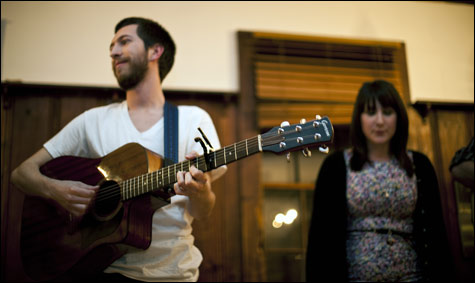
COME TOGETHER: Old Hannah singer A.K. (right) was inspired to sing folk by classical countertenor Andreas Scholl. |
The long-beating heart of Boston's folk scene may be Club Passim — and the Cantab its liver — but its bloodstream runs all through town. I don't know that much about the circulatory system, so we'll nix this metaphor in just a bit, but suffice to say, a vibrant folk scene, whatever form it takes, is a sign of health for one's larger music community.
But as the ensemble of performers scheduled for the Grand Ole Hoot (an everybody-in, fourth-wall-toppling folk throwdown set for next Thursday at the Central Y) have discovered, having a folk scene doesn't always mean having a community. Like most other enclaves of Boston music, our folk scene is fractured into so many forms as to appear formless. These kind of conditions can feel limiting, but folk, like punk, seems to thrive on imposed intimacy. For the cast of the Grand Ole Hoot, their show is a way to celebrate their little cluster of local folk culture, not an attempt to fix it.
The roots of the Hoot were planted in the attic of one Vince Bancheri (a/k/a Lonesome Vince), whose monthly hootenannies have attracted tens of new-generation local folkies, both as performers and as spectators. Although it's a little hard to tell the difference — and that's sort of the point.
"Everything that we saw at shows in the city, it wasn't," says singer-songwriter Vikesh Kapoor of the Hoots he's joined in on. "They're just very unpretentious get-togethers, very fun. The main thing is to get people to connect, to be a community — it's something that often gets lost in the geography here." After playing multiple Hoots, and growing emboldened by their convivial give-and-take atmosphere (perhaps too after bumping his head one too many times against the ceiling), Kapoor had the idea of relocating the event to a larger space. Not repurposing it, but planning it out a bit more, refining it, pushing its edges, erasing the line not just between musicians and their listeners but between listeners and their music.
"We're following some old traditions with the Grand Ole Hoot," he says over the phone from Pennsylvania, "but we're not trying to be throwbacks."
The next morning over brunch and screaming babies at Brookline Lunch, the rest of the Grand Ole gang concur. For each of them, folk means something very different. Lonesome Vince specializes in "slow moving cowboy songs" that balance thematic weight against musical simplicity. Barna Howard enjoys intertwining melody and poetry to achieve a result somewhere between Leonard Cohen and Robert Service. Old Hannah vocalist A.K. is a classically trained singer whose unlikely entrée into folk came through the interpretations of German countertenor Andreas Scholl (specifically Wayfaring Stranger, the 2001 recording he made with the Orpheus Chamber Orchestra). And Dan McDonald (a/k/a Spitzer Space Telescope) favors a folk that "fills the stage," citing the Clancy Brothers and Trail of Dead as equally influential to his output.
But despite all of the genre's differences, gradations, and offshoots, and despite the mismatched tastes of its organizers, there is a unifying, if unfashionable, force behind the Grand Ole Hoot.
"I want to bring back that feeling of sincerity that's gone from music," says Bancheri. "This shouldn't be about hearing something and thinking, 'Is this one of the types of music that I have identified as my favorite? Has Pitchfork said this is good?' I want us to tell stories with the songs, so that people can't help but listen."
Indeed, everybody seems more a lot more interested in research than relevance. Pete Seeger is their (living) patron saint. A.K. spent time as a student alternating between napping and intense listening in the BU music archive. McDonald found himself drawn to the Squawk Coffeehouse series in Harvard Square, which has had its mic plugged in since 1988. Bancheri fondly recalls having his ears opened during a course he took in "Folk Songs As Social History." "That class had everyone in it, from hipsters to the hockey team," he says. "But it made it clear that this music speaks to everyone, it's a vernacular music. It's inclusive."
He means that. The idea behind the Grand Ole Hoot is to get the whole place stomping, singing along, and maybe even jumping in on the house piano. They also hope for a turnout as diverse as those for the Hoots at Vince's place, which drew everyone from poets to punks — proving it's not such a far climb from the basement to the attic. It's not as if there were some grand ambition fueling their undertaking (though some new records on their collective Mama Bird label will be on hand). The performers just seem ready for the challenge of putting on a full-fledged stage show that will test their talent, their mettle, and the strength of their scene — instead of only the fire codes.
"If we don't do this," says A.K., "Nobody else will."
THE GRAND OLE HOOT | Cambridge YMCA, 820 Mass Ave, Cambridge | September 10 at 7 pm | $7 | www.myspace.com/mamabirdrecordingco